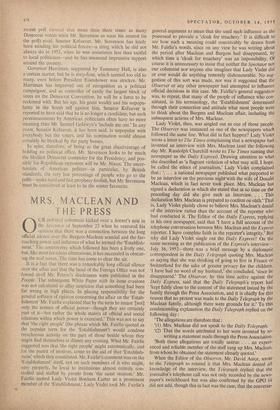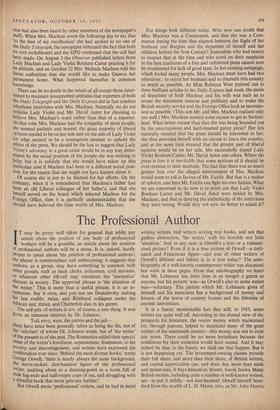MRS. MACLEAN AND THE PRESS
0 UR political columnist kicked over a hornet's nest in the Spertai.a. of September 23 when he ventured his opinion that there was a connection between the long official silence over the Burgess-Maclean scandal and the far- reaching power and influence of what he termed the 'Establish- ment: The controversy which followed has been. a lively one, bat, like most ferocious altercations, it has succeeded in obscur- ing the real issues. The time has come to clear the air.
It is a fact that there was a remarkably long official silence over the affair and, that the hand of the Foreign Office was not forced until Mr. l'etrov's disclosures were .published in the People. The subsequent White Paper with its lame evasions was not calculated to allay suspicion that something had been far wrong in high places. In placing responsibility for the general softness of opinion concerning the affair on the 'Estab, lishment' Mr. Fairlie explained that:by the term he meant 'Not] only the centres of official power—though they are certainly part of it—but rather the whole matrix of official and social relations within which power is exercised.' This was not to say that 'the right people' (the phrase which Mr. Fairlie quoted as the popular term for the 'Establishment') would .condone treacherous activity on the part of those beside whom they might. find themselves at dinner any evening. What Mr. Fairlie suggested was that 'the right people' might automatically, and for the purest of motives, come to the aid of that 'Establish- ment' which they constituted. Mr. Fairlie's comment was on the 'Establishment' itself, not on such members of it who might, very properly, he loyal to institutions almost entirely con- trolled and staffed by people from 'the same stratum.' Mr. Fairlie named Lady Violet Bonham Carter as a prominent member of the 'Establishment.' Lady Violet took Mr. Fairlie's general argument to mean that she used such influence as she possessed to provide a 'cloak for treachery.' It is difficult to see how such a meaning could conceivably be drawn from Mr. Fairlie's words, since on any view he was writing about the period after Maclean and Burgess had disappeared, by which time a `cloak for treachery' was an impossibility. Of course it is unnecessary to insist that neither the Spectator nor our columnist nor anyone else imagines that Lady Violet did or ever would do anything remotely dishonourable. No sug- gestion of this sort was made, nor was it suggested that the Observer or any other newspaper had attempted to influence official decisions in this case. Mr. Fairlie's general suggestion was, to repeat, that many of the people of influence who con- stituted, in his terminology, the 'Establishment' determined through their connection and attitude what most people were to think about the Burgess and Maclean affair, including the subsequent actions of Mrs. Maclean.
Lady Violet, then, was singled out as one of those people. The Observer was instanced as one of the newspapers which followed the same line. What did in fact happen? Lady Violet wrote a letter to The Times complaining that a newspaper had invented an interview with Mrs. Maclean (and the following day Mr. Randolph Churchill wrote to The Times naming that newspaper as the Daily Express). Drawing attention to what she described as 'a flagrant violation of what may still. I hope, be called the ethics of journalism,' Lady Violet complained that: `. . . a national newspaper published what purported to be an interview on the previous night-with the wife of Donald Maclean, which in fact never took place. Mrs. Maclean has signed a declaration in which she stated that at no time on the preceding day did she give such an interview. . . . This declaration Mrs. Maclean is prepared to confirm on ohth.' That is, Lady Violet plainly chose to believe Mrs. Maclean's denial of the interview rather than the account of the reporter who had conducted it. The Editor of the Daily Express, replying in his own newspaper, said that 'I have a full account of the telephone conversation between Mrs. Maclean and the Express reporter. I have complete faith in the reporter's integrity.' But why did Lady Violet single out the Daily Express? On the same morning as the publication of the Express's interview-- July 16, 1952—there was a brief message by a diplomatic correspondent in the Daily Telegraph quoting Mrs. Maclean as saying that she was thinking of going to live in France or Switzerland for the sake of greater privacy for the children. `I have had no word of my husband,' she concluded, 'since he disappeared.' The Observer, by this time active against the Daily Express, said that the Daily Telegraph's report had `kept fairly close to the content of the statementissited by the family through the Press Association, and it is chiefly for this reason that no protest was made to the Daily Telegraph by the Maclean family, although there were grounds for it.' To this condescending explanation the Daily Telegraph replied on the following day : `The allegations are therefore that : `(1) Mrs. Maclean did not speak to the Daily Telegraph.
`(2) That the words attributed to her were invented by re- writing a statement made through the Press Association. `Both these allegations are totally untrue . . . an experi- enced and reliable member of the staff rang up Mrs. Maclean, from whom he obtained the statement already quoted.'
When the Editor of the Observer, Mr. David Astor, wrote to the Telegraph to remind it that Mrs. Maclean denied all knowledge of the interview, the Telegraph replied that the journalist's telephone call was not only recorded by the news- paper's switchboard but was also confirmed by the GPO (it did not add, though this in fact was the case, that the conversa- tion had also been heard by other members of the newspaper's staff). When Mrs. Maclean• wrote the following day to say that to the best of my recollection' she had spoken to no one of the Daily Telegraph, the newspaper reiterated the fact that both its own switchboard and the GPO confirmed that the call had been made. On August 3 the Observer published letters from Lady Maclean and Lady Violet Bonham Carter praising it for its attitude, and on October 22 Mrs. Melinda Maclean told the Swiss authorities that she would like to make Geneva her Permanent home. What happened thereafter is common knowledge.
There can be no doubt in the minds of all except those deter- mined to maintain unsupported attitudes that reporters of both the Daily Telegraph and the Daily Express did in fact conduct telephone interviews with Mrs. Maclean. Naturally we do not criticise Lady Violet and Mr. David Astor for choosing to believe Mrs. Maclean's word rather than that of a reporter. At that time Mrs. Maclean had the sympathy of most people; she seemed pathetic and honest; the great majority of liberal Opinion tended to be on her side and on the side of Lady Violet for what seemed to be a courageous attempt to uphold the ethics of the press. We should be the last to suggest that Lady Violet's advocacy in a good cause would be in any way deter- mined by the social position of the people she was seeking to help; but it is unlikely that she would have taken up this Particular case if Maclean had been in a different social posi- tion, for the reason that she might not have known about it.
Of course she is not to be blamed for her efforts. On the contrary; when it is remembered that Maclean's father had been an old Liberal colleague of her father's, and that she herself served on the board which selected Maclean for the Foreign Office, then it is perfectly understandable that she should have believed the false words of Mrs. Maclean. But things look different today. Who now can doubt that Mrs. Maclean was a Communist, and that she was a Com- munist during the time that elapsed between the flight of her husband and Burgess and the departure of herself and her children behind the Iron Curtain? Journalists who had reason to suspect that at the time and who acted on their suspicion in the best traditions of a free and unfettered press cannot now be cbndemned for lack of good taste. In her cunning campaign. which fooled many people, Mrs. Maclean must have had two objectives : to rejoin her husband and to discredit this country as much as possible. As Miss Rebecca West pointed out in three brilliant articles in the Daily Express last week, the mode of departure of both Maclean and his wile was such as to create the maximum interest and publicity and to make the British security service and the Foreign Office look as incompe- tent as possible. (This aim Mr. and Mrs. Maclean realised only too well.) Mrs. Maclean needed some excuse to get to Switzer- land. What better excuse than that she was being hounded out by the unscrupulous and hard-hearted gutter press? Her lies naturally ensured that the press should be interested in her; she thus provided herself with an excuse to leave the country, and at the same time ensured that the greater part of liberal opinion would be on her side. She successfully duped Lady Violet Bonham Carter, Mr. David Astor and others. Where the press is free it is inevitable that some sections of it should be over-zealous in their methods. The fact that there was so much greater fuss over the alleged mistreatment of Mrs. Maclean would seem to tell in favour of Mr. Fairlie. But that is a matter of opinion, and here Mr. Fairlie can fight his own battles. What we are concerned to do now is to point out that Lady Violet Bonham Carter and Mr. David Astor were misled by Mrs. Maclean; and that in denying the authenticity of the interviews they were wrong. Would they not now do better to admit it?











































 Previous page
Previous page